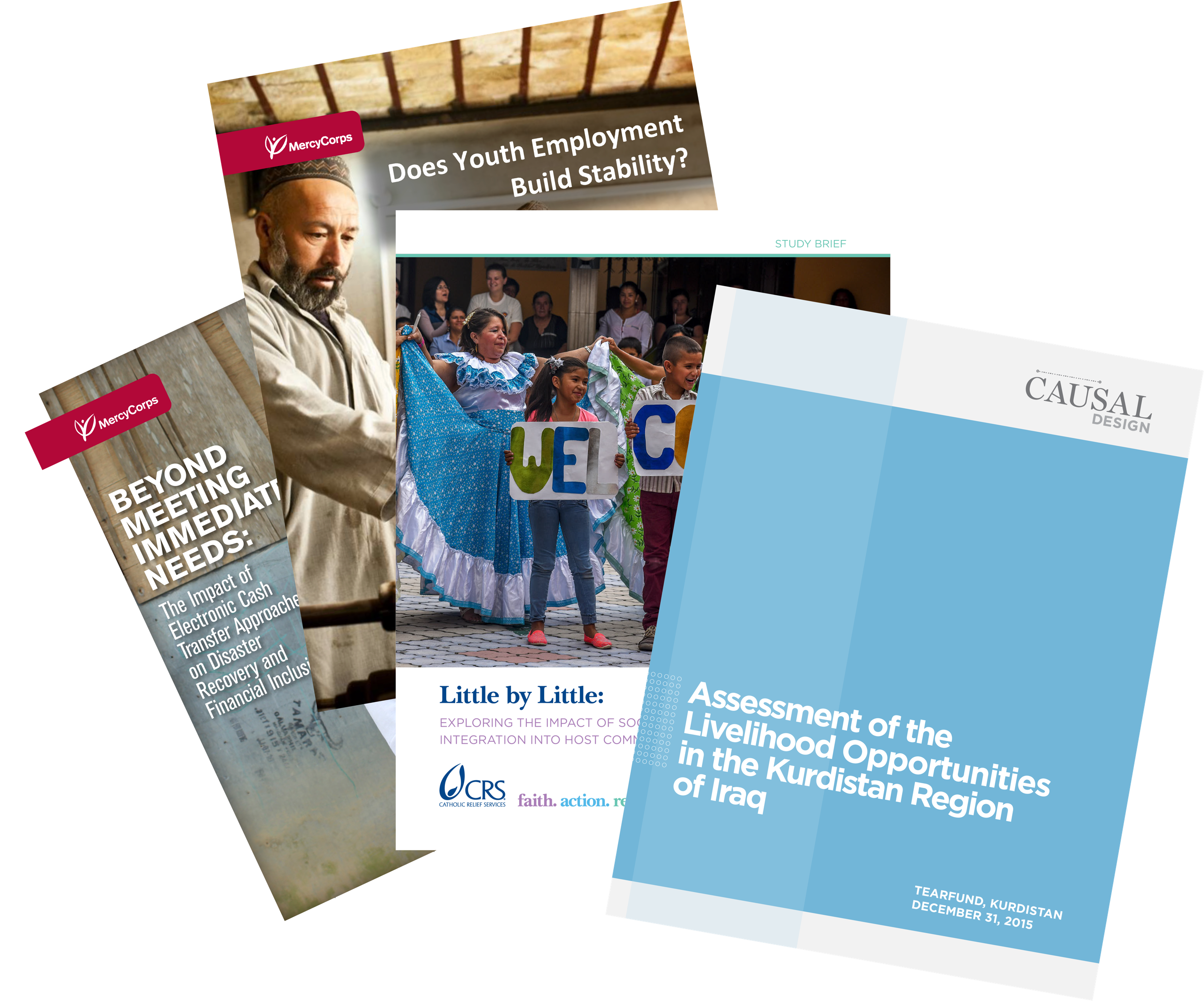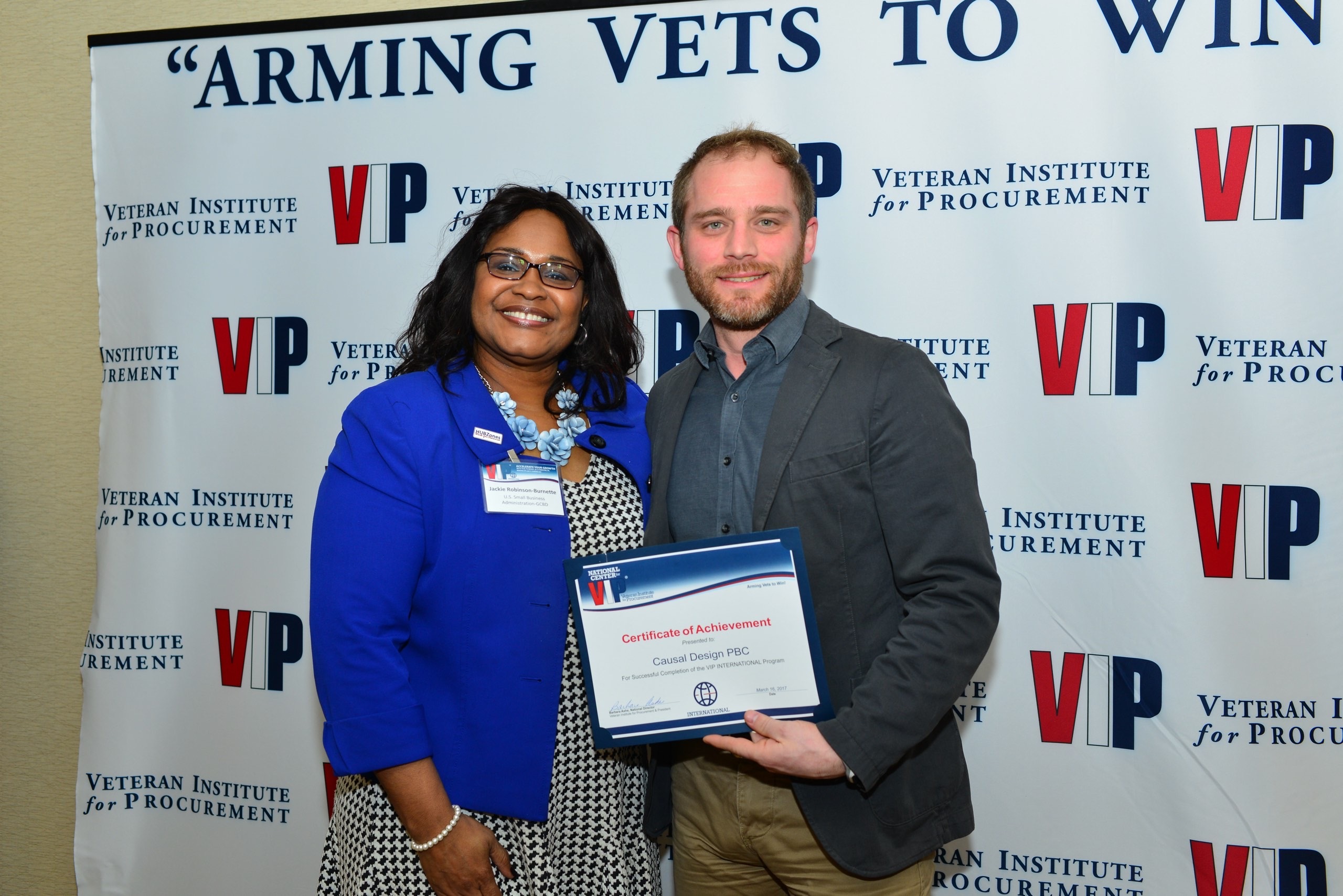Causal Design, a Service-Disabled Veteran-Owned Small Business (SDVOSB), is transforming development programs by promoting evidence-based interventions and fostering a culture of data-driven decision-making. The Denver-based economic research firm specializes in impact evaluation and cost-effectiveness, playing a critical role in USAID’s humanitarian efforts globally.
Co-founded by Marine and Iraq War veteran Keith B. Ives, Causal Design has grown from a niche consultancy to a prime contractor for USAID. Ives’ background—combining military experience with humanitarian work for organizations like the Red Cross and Doctors Without Borders—has shaped the firm’s approach to addressing complex development issues in fragile and conflict-prone areas.

USMC Sgt. Ives, in Al Anbar, Iraq while deployed as a Marine in 2005/06.
Mission and Methodology
Causal Design’s mission to “Create cultures of evidence” aligns with USAID’s commitment to learning while reducing poverty and promoting prosperity. The firm prides itself on being problem-driven, working hand-in-hand with USAID and its partners to solve the big learning questions and challenges they encounter in project design and implementation. Causal Design specializes in applied research, impact evaluation, economic analysis, and program monitoring. By providing data-driven insights, Causal Design helps USAID make informed decisions and allocate resources effectively.
The firm specializes in methodologies like randomized control trials, mixed-method evaluations, and cost-effectiveness analysis to assess the impact and efficiency of USAID programs. These approaches allow for real-time improvements, ensuring that USAID’s investments lead to sustainable, measurable benefits and contribute to long-term development goals.
Supporting USAID’s Evidence-Based Efforts
For the past five years, Causal Design has supported USAID’s efforts to build its evidence base. In partnership with Save the Children, Causal Design has worked on the Implementer-Led Evaluation and Learning Associate Award, focused on improving resilience and food security activities (RFSAs) in Madagascar and Ethiopia. Causal Design evaluated performance, impacts, and cost-effectiveness across four RFSAs, enhancing accountability and increasing the effectiveness of USAID’s programs.
Additionally, Causal Design has been instrumental in the Humanitarian Assistance Evidence Cycle, a USAID initiative aimed at expanding the evidence base for emergency food security programs. Causal Design provides capacity-strengthening for impact evaluation and cost-effective design and funds new evaluations for emergency programs, helping USAID refine its emergency assistance activities to be more responsive and cost-effective.
Through the Building Evidence for Decision-Making program, a 10-year initiative, Causal Design is integrating evidence generation and utilization into all stages of USAID’s program cycle. This initiative, led by USAID’s Bureau for Inclusive Growth, Partnerships, and Innovation, aims to embed robust research and learning frameworks that enhance the effectiveness of USAID projects.
In September 2024, Causal Design was awarded the Sudan Monitoring Project, a five-year, $25 million contract with USAID’s Bureau for Humanitarian Assistance. This project tasks Causal Design with monitoring and evaluating USAID activities in the Blue Nile and South Kordofan regions, as well as other inaccessible areas. With Sudan facing an ongoing humanitarian crisis, Causal Design’s expertise in data collection and conflict-zone operations will be critical in supporting USAID’s efforts to address food security and displacement challenges.

Field staff prepare to interview a farmer in Rwanda.
Expanding Collaborations
Causal Design’s partnerships with USAID span various regions and sectors, contributing to several high-impact initiatives. For example, the firm played a key role in supporting the Palladium-led Agricultural Diversification activity for USAID/Malawi, which focused on boosting agricultural productivity and improving food security through market-based interventions. Causal Design employed community-led data collection, experimental evaluation methods, and real-time dashboards to track progress and respond to local shocks and stressors.
In Afghanistan, Causal Design collaborated with MSI on the Afghanistan Monitoring, Evaluation, and Learning Activity, evaluating and monitoring health, education, and democracy-strengthening initiatives. The firm’s data and analysis provided USAID’s Mission in Afghanistan and Washington-based Bureaus with the tools to ensure accountability and adapt their strategies in a volatile environment.

Causal Design research reports for implementing partners working in humanitarian contexts.
In 2024, Causal Design formed a strategic partnership with Panagora Group, creating CausAgora, a certified SDVOSB under the SBA’s Mentor-Protégé Program. This collaboration provides integrated, data-driven solutions to complex development challenges. By combining Causal Design’s strengths in evaluation and research with Panagora’s expertise in collaboration, learning, and adaptation and knowledge management, CausAgora aims to improve USAID’s program outcomes across sectors like health, education, and governance. This partnership exemplifies Causal Design’s commitment to scaling impact and expanding its capacity to meet USAID’s evolving needs.
Veteran Leadership and Global Impact
Causal Design’s success highlights the leadership and expertise of U.S. veterans in sectors beyond defense. As a veteran-led organization, the firm emphasizes the ongoing contributions of veterans to public service and global development. Causal Design actively collaborates with organizations like the Small Business Association for International Contractors and USAID’s Office of Small and Disadvantaged Business Utilization to reduce barriers and create opportunities for disabled veterans to support USAID’s mission.

Causal Design CEO, Keith B. Ives, stands with an SBA representative at graduation from the Veteran’s Institute for Procurement.
Keith B. Ives: https://www.linkedin.com/in/keithives/
Causal Design: https://www.linkedin.com/company/causal-design/





